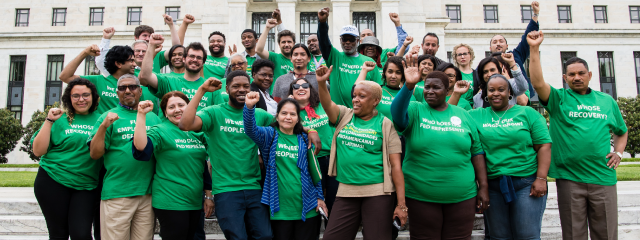Big Bank Settlements: Will Public Pressure Bring Homeowner Relief?

This month Citigroup became the latest major bank to conclude a multi-billion dollar settlement with the US Department of Justice, agreeing to pay $7 billion to settle charges over the sale of flawed mortgage securities. The settlement includes $2.5 billion to be spent on relief for underwater homeowner and lending activities designed to help communities hard hit by predatory lending rebuild.
As Richard Eskow of the Campaign for America’s Future wrote, the settlement probably would not have happened at all without public pressure: “The Obama administration is clearly feeling the heat about its treatment of Wall Street. Otherwise the rhetoric wouldn’t be quite as stern and the settlement figures would probably be lower.”
While the Citigroup settlement contained more detailed language about getting the promised relief to hard hit communities than past settlements, the Home Defenders League, a grassroots coalition and membership organization of homeowners affected by the mortgage crisis continues to press the fact that past settlements have not delivered as promised, especially in communities of color that were targeted for predatory lending. As the Wall Street Journal reported:
Some activists are still skeptical of the government’s settlements with the financial industry. Kevin Whelan, national campaign director for the Home Defenders League, an activist group representing homeowners, said there’s been no noticeable impact from last fall’s J.P. Morgan settlement.
“We haven’t seen any evidence that they’ve done anything at all,” Mr. Whelan said.
Just days before the Citigroup settlement, Home Defenders League members and partner groups delivered thousands of petition signatures and letters demanding greater oversight and accountability for settlements the Justice Department to U.S. Attorney’s offices in ten cities. US Attorney Callahan of Missouri and US Attorney Walsh in Colorado agreed to contact Attorney General Holder directly with the community’s concerns.
The actions and a simultaneous “#ShowUsTheMoney” twitter rally brought attention the plight of families still reeling from the mortgage crisis, many of them featured on the “100 Stories of What Wall Street Broke” blog.












